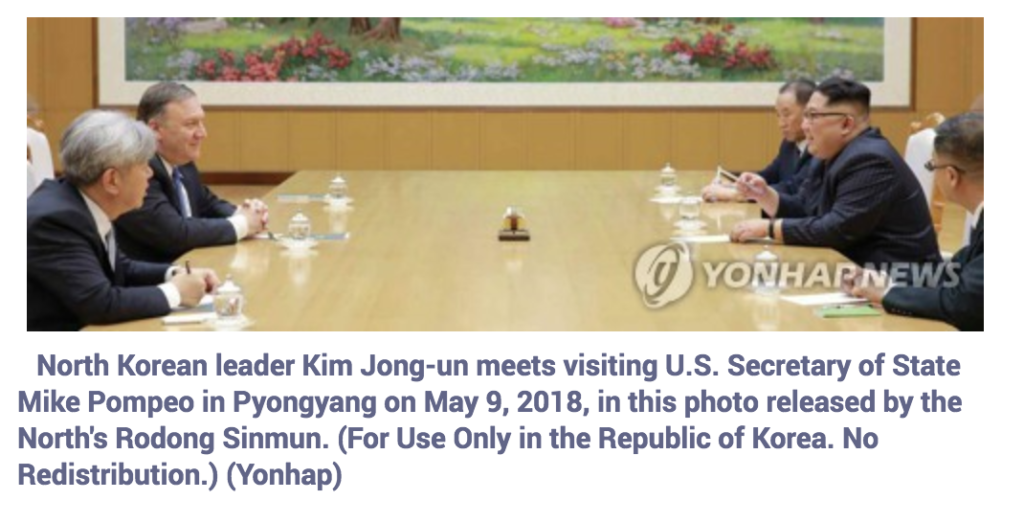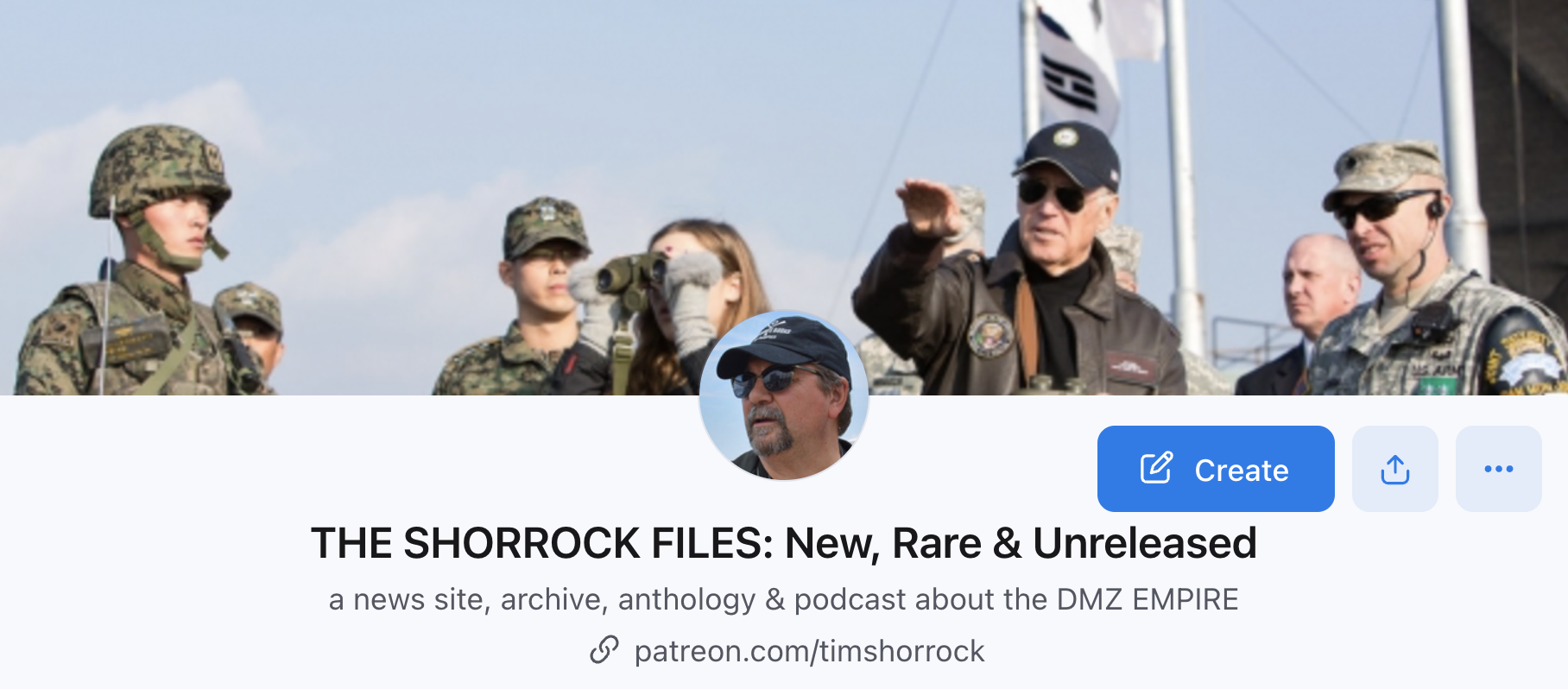The CIA, as I’ve been saying for weeks, is running the show for Trump’s North Korea peace and denuclearization initiative, and its role is expanding as the date (June 12) for the Kim summit draws ever closer.
Last night, just before President Trump met the US “hostages” just released by North Korea at Joint Base Andrews, Yonhap reported that Andrew Kim, the head of the CIA’s Korea Mission Center, had accompanied Secretary of State (and former CIA Director) Mike Pompeo to Pyongyang this week to meet with Kim Jong Un and his chief deputy (and a former spy himself), Kim Yong-chol.

In a photo released by the North’s official Korean Central News Agency, the silver-haired Kim was sitting close to Pompeo at a meeting with the North Korean leader.
Observers said that the Korean-born Kim, who is known to have emigrated to the U.S. when he was a high school student, might have been selected to assist the top U.S. diplomat as he is fluent both in Korean and English, and has security clearance as an intelligence agent.
Andrew Kim previously served in senior CIA posts in charge of Korea and the Asia Pacific region, and is known for his deep knowledge of the North. His views are reportedly critical of the reclusive state.
And most interesting:
The Korea center chief is also known to have gone to the same high school in Seoul as South Korea’s chief presidential security advisor Chung Eui-yong and Suh Hoon, the director of Seoul’s National Intelligence Service.
Here’s what I wrote in a March 22 analysis in The Nation on the critical role of the US, South Korean and North Korean intelligence agencies in the peace process:
In 2017, about a week after Moon was sworn in as president, the CIA set up a Korea Mission Center that integrates officers from across the agency to “bring their expertise and creativity to bear against the North Korea target” (intelligence contractors like CACI are busy recruiting to fill the spots). Unusually for a CIA center, it has been fairly open in its work, with Pompeo and the top deputies of the center appearing as speakers at public events, including an academic conference in Washington last October. In contrast, Tillerson spoke little in public about Korea, except in brief interviews with the press.
Pompeo also “became more active in the CIA’s Daily Briefs where he’s personally briefing the president,” said DeTrani, the former intelligence officer. “So I think it makes eminent sense that he would be the point person on what is going on with North Korea.” Moreover, when the talks get to a stage where verification of a testing moratorium and other steps is required, US intelligence assets controlled by the CIA and the National Security Agency will be crucial, he said.
I was convinced that Pompeo was in command on January 23, when he delivered a public speech at the American Enterprise Institute and spent most of his time talking—and answering questions—about North Korea. It was one of the most detailed administration speeches yet on Korea and, to a careful listener, signaled that the Trump administration had thoroughly grasped the significance of Kim Jong-un’s confirmation that he had completed development of his nuclear program and would no longer be testing.
“The logical next step [for Kim] would be to develop an arsenal of weapons” that would have “the capacity to deliver from multiple firings of these missiles simultaneously,” Pompeo said. “That’s the very mission set that President Trump has directed the government to figure out a way to make sure it never occurs.” He added: “The president is intent on delivering this solution through diplomatic means. It is the focus.”
In what had to be a carefully controlled leak, last Friday the Times confirmed that Pompeo has been in close contact with North Korea “through a channel that runs between the C.I.A. and its North Korean counterpart, the Reconnaissance General Bureau,” which combines the country’s formidable intelligence and special forces.
Pompeo, the Times said, is also working closely with Suh Hoon, the director of South Korea’s National Intelligence Service (NIS), who was in Pyongyang with Chung Eui-yong, the national security adviser. As a deputy NIS director earlier in the century, Suh lent important support to the Sunshine Policy and helped organize, with North Korean intelligence, the previous summits in 2000 and 2007 (Moon was in Pyongyang for the last one, as President Roh’s chief of staff).
Suh’s counterpart and primary host in Pyongyang was Kim Yong-chol, a vice chairman of the Central Committee of North Korea’s ruling Workers’ Party and the former head of the spy agency who now overseesPyongyang’s relationship with South Korea. He was also Kim Jong-un’s delegate in Pyeongchang for the closing ceremonies of the Winter Olympics and, most significantly, was the official who told Moon that the North was willing to have parallel negotiations with the United States.
“He’s a [Workers’] party guy, and has done some bad things in the past,” says Sigal, referring to Kim Yong-chol. According to the South Korean government, in 2010 Kim Yong-chol masterminded the attack and sinking of a South Korean naval vessel that killed 46 sailors and brought North-South relations to an all-time low (North Korea denied involvement, and some Koreans have raised doubts about Kim Yong-chol’s involvement).
Even so, says Sigal, he is one of the best-informed North Koreans on the United States. “People don’t know he was involved with the military-to-military talks with us and the South Koreans” during the Bush administration, said Sigal. “He has a long history of knowledge about the US.”
Joel Wit, a former US negotiator on the 1994 Agreed Framework, told a Monday press briefing at the US-Korea Institute that the CIA’s channel to North Korean intelligence has existed with “ongoing contacts” since 2009, including visits to North Korea by intelligence officials in 2012 and in 2014 by James Clapper, the former Director of National Intelligence.
Kim Yong-chol “has been the main contact in this channel for much of the time,” he said. But Wit, who participates with DiMaggio in the Track II talks with North Korean diplomats, cautioned that intelligence channels are “not ideal” and have “serious drawbacks,” compared with diplomacy. “You can’t just send some intelligence analysts off to meet with North Koreans and think that that’s going to work well,” he warned.
No surprise, then, that Kim Yong-chol was Pompeo’s key interlocutor during this week’s visit to Pyongyang. Could this be the beginning of a beautiful friendship?
